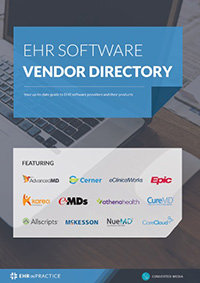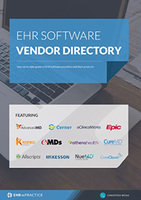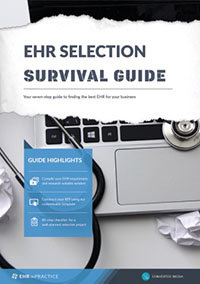Evaluating EHR vendor support availability
Vendor support can be viewed as both a resource to facilitate implementation, but also a resource which can allow an organization to optimize how they use their EHR. More vendor support has been linked to positive gains in patient care. For example, according to a Black Book Market Research survey, organizations who use EHR vendors that do not offer EHR tech support as an in-house or outsourced service have far fewer opportunities to positively affect patient care through EHR use. Furthermore, of the 4,446 respondents in the survey, 85 percent reported that patient care is substantially hindered by unsatisfactory EHR user support.
When considering an EHR vendor, it is important to consider the important role vendor support occupies in implementing and using an EHR and in the overall function of care delivery.
What support options do EHR vendors usually offer?
Vendors offer a range of support services. The most fundamental service vendors offer involves providing contact support to users who may have questions about the EHR product or service or require technical support in resolving a problem with functionality or features. Contact support can come in the form of phone support or online support through a chat function or way to submit information to support electronically.
When engaged in troubleshooting an issue a vendor may work through an issue with a customer over the phone, or online, but also may require access to the EHR system. In this case, vendor support staff may be able to use a feature in the EHR that allows them to take a screenshot of the problem remotely or access the system remotely to troubleshoot the problem.
In addition to contacting the vendor for questions or troubleshooting, a vendor may also offer access to self-help information which allows users the opportunity to read the information that can assist users in troubleshooting and solving issues or enhance their skills.
Check out our free guide to selecting an EHR vendor for your practice
Lastly, vendor support can also involve providing training during implementation and ongoing training that can help users learn how to use the EHR and become more active users after go-live. Training can come in the form of on-site training or online programs that can be done to suit busy schedules and staff who may work at off-site locations.
What is ‘vendor support’?
Vendor support can come in many forms and be delivered through a variety of channels. Therefore, one should not assume vendor support is a generic option available in all EHR products. Instead, it can involve several different types of services some of which can be valuable; others can often compound existing problems.
From a broad perspective, vendor support is offered either as an in-house or outsourced service. In house vendor support ideally will involve individuals who are familiar with the product or service and can provide assistance based on firsthand knowledge. Under this type of support, a customer with a problem contacts the vendor, and a member of the vendor’s staff, with working knowledge of the product or service, assists the customer.
Outsourced vendor support involves using support staff who the vendor contracts with to troubleshoot issues with its product or service. Is not bad per se, rather it is limited by the third-party service provider’s ability to offer deep insight into issues the customer is experiencing. Unlike in house support which is handled by individuals with first-hand working knowledge of the EHR product, third party or outsourced vendor support primarily involves support being provided by individuals who have not worked with the EHR product and are trained to troubleshoot issues by taking information from the customer and connecting it to scripted responses provided by the vendor. The Black Book survey referenced earlier may indicate that outsourced vendor support may be linked to a greater likelihood of customer dissatisfaction. For example, in the survey, 72% of hospital tech managers surveyed stated that they prefer their EHR vendor deliver “direct, comprehensive tech support” rather than outsourcing these services to a third party. Further, 82% of customers whose vendor employs third-party outsourcing tech support are “significantly dissatisfied” with the level of response and the quality of their services in the twelve months following go-live.
How to determine which support package fits your needs
When selecting a support package, a thorough assessment of your organization’s needs will need to be conducted. Evaluating the type of support required should begin early in the selection process and involve both the selection team and key stakeholders in your organization. One method of assessing support needs involves incorporating questions regarding support needs into the requirements gathering process. Therefore a practice can understand the features and functionality they require in an EHR, but also the type of support they will require to implement them.
It is also important to note that determining the type of support that will be required also should be an ongoing process. The reason that one should not assume that evaluating support needs should conclude after implementation is that users may have trouble with the system or may require additional training for advanced features and therefore should have resources available to them to remedy these issues. Further, situations in which minor “glitches” or massive failures in the system may arise after go-live, therefore your organization should consider how these issues will be addressed without comprising clinical data and hindering care delivery.
Is it worth paying for added support?
It is challenging to offer cost estimates for the support given that the level of support will vary based on the vendor’s contract terms, mainly whether the vendor includes support and training in its contract as an added cost or whether the vendor offers support as an add-on that must be purchased. With the previous caveat in mind, it is essential to pay particularly close attention to the vendor’s contract terms during the selection process to make certain that the support services being offered, and their cost is compatible with your practice’s needs. Lastly, under no circumstances should an organization overlook the importance of vendor support and training even if these services must be purchased.
To illustrate this importance of vendor support one need only look at the data available linking quality and efficiency of care delivery and customer satisfaction with better and more thorough vendor support. As such, an organization should consider vendor support as an essential consideration during the selection process.
Free white paper

EHR Vendor Directory
Get the most up-to-date directory of EHR software vendors. Find the best software for your practice.

Featured white papers
-

EHR Selection Survival Guide
The comprehensive guide to selecting the best EHR system for your medical practice.
Download -

EHR Vendor Directory
Get the most up-to-date directory of EHR software vendors. Find the best software for your practice.
Download -

EHR Pricing Guide
Get your complete guide to EHR software pricing and project costs. Your headstart on EHR pricing research
Download




